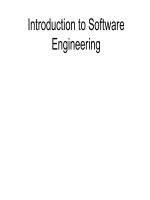An Introduction to Software Engineering
Bạn đang xem bản rút gọn của tài liệu. Xem và tải ngay bản đầy đủ của tài liệu tại đây (46.01 KB, 11 trang )
©Ian Sommerville 2004 Software Engineering, 7th edition. Chapter 1 Slide 1
An Introduction to Software
Engineering
©Ian Sommerville 2004 Software Engineering, 7th edition. Chapter 1 Slide 2
Objectives
To introduce software engineering and to explain
its importance
To set out the answers to key questions about
software engineering
To introduce ethical and professional issues and
to explain why they are of concern to software
engineers
©Ian Sommerville 2004 Software Engineering, 7th edition. Chapter 1 Slide 3
Topics covered
FAQs about software engineering
Professional and ethical responsibility
©Ian Sommerville 2004 Software Engineering, 7th edition. Chapter 1 Slide 4
Software engineering
The economies of ALL developed nations are
dependent on software.
More and more systems are software controlled
Software engineering is concerned with theories,
methods and tools for professional software
development.
Expenditure on software represents a
significant fraction of GNP in all developed
countries.
©Ian Sommerville 2004 Software Engineering, 7th edition. Chapter 1 Slide 5
Software costs
Software costs often dominate computer system
costs. The costs of software on a PC are often
greater than the hardware cost.
Software costs more to maintain than it does to
develop. For systems with a long life,
maintenance costs may be several times
development costs.
Software engineering is concerned with cost-
effective software development.
©Ian Sommerville 2004 Software Engineering, 7th edition. Chapter 1 Slide 6
FAQs about software engineering
What is software?
What is software engineering?
What is the difference between software
engineering and computer science?
What is the difference between software
engineering and system engineering?
What is a software process?
What is a software process model?
©Ian Sommerville 2004 Software Engineering, 7th edition. Chapter 1 Slide 7
FAQs about software engineering
What are the costs of software engineering?
What are software engineering methods?
What is CASE (Computer- Aided Software
Engineering)
What are the attributes of good software?
What are the key challenges facing software
engineering?
©Ian Sommerville 2004 Software Engineering, 7th edition. Chapter 1 Slide 8
What is software?
Computer programs and associated documentation such
as requirements, design models and user manuals.
Software products may be developed for a particular
customer or may be developed for a general market.
Software products may be
• Generic - developed to be sold to a range of different customers
e.g. PC software such as Excel or Word.
• Bespoke (custom) - developed for a single customer according
to their specification.
New software can be created by developing new
programs, configuring generic software systems or
reusing existing software.
©Ian Sommerville 2004 Software Engineering, 7th edition. Chapter 1 Slide 9
What is software engineering?
Software engineering is an engineering discipline
that is concerned with all aspects of software
production.
Software engineers should adopt a systematic
and organised approach to their work and use
appropriate tools and techniques depending on
the problem to be solved, the development
constraints and the resources available.
©Ian Sommerville 2004 Software Engineering, 7th edition. Chapter 1 Slide 10
What is the difference between software
engineering and computer science?
Computer science is concerned with theory and
fundamentals; software engineering is concerned
with the practicalities of developing and
delivering useful software.
Computer science theories are still insufficient to
act as a complete underpinning for software
engineering (unlike e.g. physics and electrical
engineering).
©Ian Sommerville 2004 Software Engineering, 7th edition. Chapter1 Slide 11
What is the difference between software
engineering and system engineering?
System engineering is concerned with all
aspects of computer- based systems
development including hardware, software and
process engineering. Software engineering is
part of this process concerned with developing
the software infrastructure, control, applications
and databases in the system.
System engineers are involved in system
specification, architectural design, integration
and deployment.
©Ian Sommerville 2004 Software Engineering, 7th edition. Chapter1 Slide 12
What is a software process?
A set of activities whose goal is the development
or evolution of software.
Generic activities in all software processes are:
• Specification - what the system should do and its
development constraints
• Development - production of the software system
• Validation - checking that the software is what the
customer wants
• Evolution - changing the software in response to
changing demands.
©Ian Sommerville 2004 Software Engineering, 7th edition. Chapter1 Slide 13
What is a software process model?
A simplified representation of a software process,
presented from a specific perspective.
Examples of process perspectives are
• Workflow perspective - sequence of activities;
• Data-flow perspective - information flow;
• Role/action perspective - who does what.
Generic process models
• Waterfall;
• Iterative development;
• Component-based software engineering.
©Ian Sommerville 2004 Software Engineering, 7th edition. Chapter1 Slide 14
What are the costs of software engineering?
Roughly 60% of costs are development costs,
40% are testing costs. For custom software,
evolution costs often exceed development costs.
Costs vary depending on the type of system
being developed and the requirements of system
attributes such as performance and system
reliability.
Distribution of costs depends on the
development model that is used.
©Ian Sommerville 2004 Software Engineering, 7th edition. Chapter1 Slide 15
Activity cost distribution
Wat erfall model
Iterative development
Component-based software eng ineering
Development and evolution costs for long-lifetime syst ems
Systemevolution
10 200
30
4000
Systemdevelopment
Specification Design Development Integ ration and testing
25 50
75
1000
Specification Development Integ ration and testing
25 50
75
1000
Specification Iterative development Systemtesting
25 50 75 1000






![springer, mathematics for finance - an introduction to financial engineering [2004 isbn1852333308]](https://media.store123doc.com/images/document/14/y/so/medium_ogFjHNa13x.jpg)


